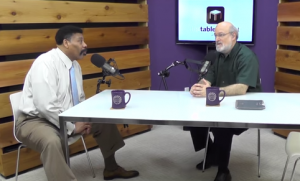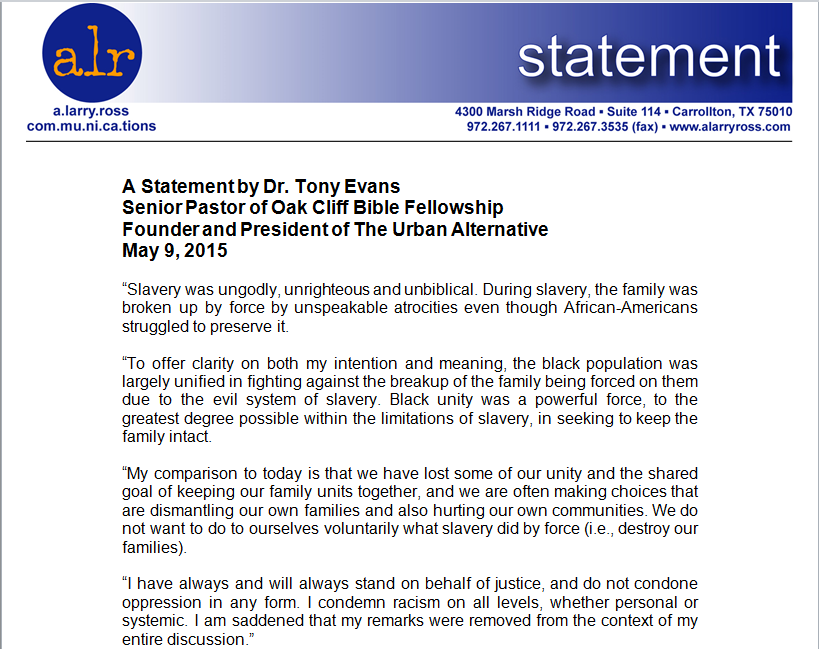Tony Evans is the founder and pastor of Oak Cliff Bible Fellowship in Dallas TX and the chairman of the executive council of The Gathering, a solemn assembly of pastors and Christians which took place yesterday. In his introduction to the day, Evans raised three possibilities regarding America. One is that Christ will return and set up His Kingdom. The second one is that America will be judged and taken off “the scene,” and a third is that American Christians pray and repent and change God’s mind about America’s demise. Watch:
Transcript:
There are 3 options before us. If Jesus comes back, we won’t worry about any of this. In the immediate future, it won’t be our problem. The second option is that our nation is under final judgment and so there is no hope.
But there is a third option. “If my people will call my name, shall humble themselves, turn from their wicked ways, and seek my face, I will heal them, and I will flow from them.” If Jesus doesn’t come back in the immediate future, that’s your children, and your grandchildren, and your great grand children, and they’re gonna live in some kind of land. Either it will be a land influenced by God’s people and godliness, or influence led and ruled by evil, and it all depends on the church.
Regularly, as Pastor Morris says, God say, I’m waiting on you. Moses, as he said, put out the rod, Joshua, tell the priest to put the water-put their foot in the water before I open up the Jordan River. Martha, pull the stone away, until you pull the stone away, I do not need a discussion on mortuary science, until you move the stone, you will not see what I am up to in secret, because you won’t do what I told you to do in public.But when God’s presence and purpose is being manifested through his people, we give Him another option. And let me tell you how powerful this option is. If Christ be not come. It is such a powerful option that if we gave-give God our undivided attention and undivided focus, it is such a powerful option that we can literally change God’s mind, on earth about what He had previously decided to do from eternity. Throughout the Bible, you will see God changing His mind. So even if Option 2 is on the plate, to remove America off the scene, Christ be not come, let’s go about changing God’s mind. Let’s do what we do like Moses did when God said He would destroy Israel and Moses pled that would mess up your reputation, and when He heard his prayer, He changed his mind. God is flexible. Let’s appeal to that flexibility.
Evans misquotes II Chronicles 7:14 (bold print above) as a proof that God will change his mind if we pray and repent. The verse in full goes like this:
If my people, who are called by my name, will humble themselves and pray and seek my face and turn from their wicked ways, then I will hear from heaven, and I will forgive their sin and will heal their land.
I have never understood why people mistake this as a promise to America. American citizens are not His people called by God’s name. This verse is not addressed to Americans. This verse is the second half of a sentence started in verse 13 and concerns the dedication of the Jewish temple led by King Solomon.
11 When Solomon had finished the temple of the Lord and the royal palace, and had succeeded in carrying out all he had in mind to do in the temple of the Lord and in his own palace, 12 the Lord appeared to him at night and said:
“I have heard your prayer and have chosen this place for myself as a temple for sacrifices.
13 “When I shut up the heavens so that there is no rain, or command locusts to devour the land or send a plague among my people, 14 if my people, who are called by my name, will humble themselves and pray and seek my face and turn from their wicked ways, then I will hear from heaven, and I will forgive their sin and will heal their land. 15 Now my eyes will be open and my ears attentive to the prayers offered in this place. 16 I have chosen and consecrated this temple so that my Name may be there forever. My eyes and my heart will always be there.
God made an agreement with Solomon regarding Israel. On behalf of America, who made such a covenant?
This promise was made in a very specific way to Solomon about the very homogeneous Jewish nation. Despite a majority Christian population, there is no civil requirement to keep Christian morality. There is no civil requirement to even be a Christian to serve in government. It is very simple, these verses have nothing to do with us. We are not a new Israel.
There is nothing wrong with praying and repenting. However, a nation such as ours doesn’t do it, people do.

